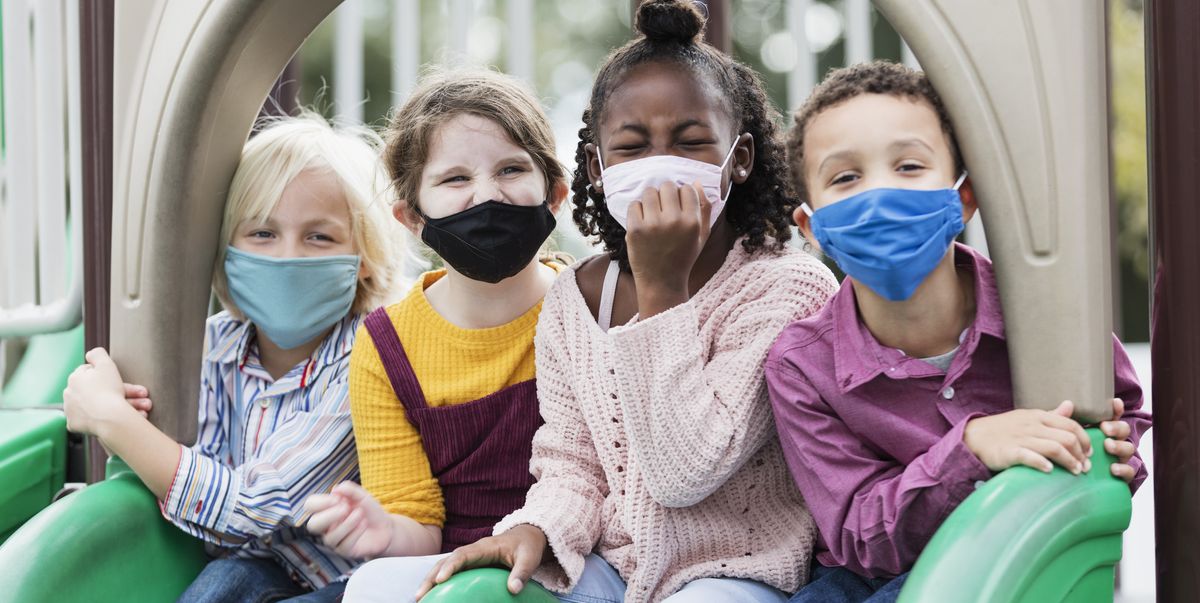- Parents who have tested positive for COVID-19 may not have to quarantine their children at home, according to federal guidelines.
- The protocol for children that have been exposed largely depends on whether or not they have been vaccinated against COVID-19.
- Be aware that federal guidelines may be secondary to protocols in place at your child’s school, your county’s health department, or state rules and stipulations.
Despite your best efforts, you’ve fallen ill, and a COVID-19 test has revealed you are indeed positive. Taking care of your own health is a priority, and if you’re a parent with little ones to watch after, you may wonder if you need to keep them home from school — and if that’s even the best way to prevent them from getting sick, too.
According to current federal guidelines, the timeline for quarantining your children — or determining if they even need to stay home from school — all depends on the vaccination status of everyone in your family, namely the individual who has fallen sick and the child in question. The best possible scenario in this dilemma often presents itself to adults and children who are up to date on their COVID-19 vaccinations; meaning, you’ve received a full series of initial vaccinations as well as any recommended booster doses and holistic health needs. In this case, you may be surprised to hear that a COVID-19 diagnosis doesn’t have to be an automatic mandate to keep all of your children home from school.
To determine if you should keep your kids home, you should start by consulting local guidance and quarantine rules at your child’s school. The protocol can drastically differ by city and state, or could be entirely dictated by a school’s internal guidance — but if you’re still unsure or have determined existing rules do not already exist, you can always turn to the suggestions established by officials at the Centers for Disease Control and Prevention (CDC).
Below, we’re recapping the guidelines set forth by the CDC when it comes to quarantining children if a parent has become sick, or if a child has been exposed to COVID-19 while at home.
As more information about the coronavirus pandemic develops, some of the information in this story may have changed since it was last updated. For the most up-to-date information on COVID-19, please visit online resources provided by the CDC, WHO, and your local public health department.
Can I send my kids to school if I have tested positive for COVID-19?
According to current federal guidelines, children who have received a full COVID-19 vaccination and are up to date on any recommended boosters aren’t mandated to stay home, explains Stanley Spinner, M.D., vice president and chief medical officer at Texas Children’s Pediatrics and Texas Children’s Hospital Urgent Care. Adults who are confirmed positive will need to isolate at home for at least 5 days or until they are “fever-free and are feeling better,” Dr. Spinner says. “For [exposed] kids between the ages of 5 and 16, they would have needed to have had both doses of their Pfizer vaccine [to stay at school], or else would need to quarantine as well.”
This content is imported from Twitter. You may be able to find the same content in another format, or you may be able to find more information, at their web site.
As a sick parent, if you’re unable to isolate from your children, you should be wearing a mask while around them at all times through day 10 of your sickness, Dr. Spinner adds. And while vaccinated children may not need to quarantine at home if they’re not symptomatic, testing for COVID-19 should be done if possible to confirm they’re healthy — especially if any known COVID-19 symptoms begin to appear within five days of your confirmed test.
“For an individual who has had direct exposure to an infected individual, the CDC does recommend getting tested five days after the exposure, assuming that individual is not symptomatic,” Dr. Spinner tells Good Housekeeping.
If your child isn’t up to date on vaccinations or hasn’t started a vaccination series yet, federal guidelines indicate that they’ll have to quarantine at least five days at home if anyone in their home has tested positive for COVID-19. Testing this child for COVID-19 to confirm they are not infectious prior to sending them back to school can reduce the risk of others getting sick in your community.
There may be a situation, due to logistics, where home-bound quarantine isn’t possible for a child who should remain at home. In this case, Dr. Spinner stresses that children and teens in question must wear a mask while outside of the home for at least 10 days at the very least. Doing so can reduce the risk of a potential outbreak in your child’s school — and should only be seen as a very last resort.
Can my kids return to school if I was exposed?
If you’re up to date on your vaccinations and have been exposed to someone who has tested positive for COVID-19 — but you haven’t exhibited symptoms or tested positive yourself — your child does not have to quarantine at home, Dr. Spinner clarifies.
“Your child may need to subsequently quarantine, based on his or her vaccine status, however, if you subsequently develop symptoms at a later date and test positive for COVID-19,” he adds.
While less accurate compared to all available tests on the market, a home-bound rapid antigen COVID-19 test may help you earn peace of mind if you’re unsure about your own or your child’s infection status. It’s best to do a few rounds of tests if you’re worried about being asymptomatic (without symptoms), Dr. Spinner says. “The rapid antigen tests may show negative if done too early into the course of the infection, but show positive if repeated two to three days later.”
What should I do if a sibling or any other family member has tested positive?
If you have more than one child at school, it’s entirely possible that one child may test positive for COVID-19 due to a unique exposure — and you’ll end up wondering if their siblings should remain home as well. This may be true for anyone living in your home, really; whether it be an older brother or sister, a parent, a caregiver or an older relative who needs care. You should treat any exposure, especially those of confirmed individuals, similarly as if the exposure came directly from you, Dr. Spinner advises.
Siblings or otherwise, the need to quarantine is still based on vaccine status — if your child is up to date on vaccinations, they won’t need to quarantine after exposure to someone who has been impacted by SARS-CoV-2, the virus that leads to a COVID-19 diagnosis. It’s only those who are unvaccinated — or kids who begin to feel sick and experience known symptoms, including seemingly harmless issues like sore throat or nausea — that are recommended to stay home from school to quarantine.
What to keep in mind before sending a child back to school:
Because Omicron COVID-19 infections are continuing to spread through asymptomatic cases of the sickness, CDC guidance does indicate that it’s best to test a child 5 days after any direct exposure to a sick individual, as it’s a precaution to stem further spread of the disease.
Regardless of when or if you decide to test, experts say school-age children should be wearing masks throughout the majority of their day on campus — this can further reduce any risk of an asymptomatic case impacting other children in their classroom. Providing your child with clean, well-designed masks throughout the day can bolster their personal protection against any exposure in the classroom, but also work to aid others’ protection after any exposure, Dr. Spinner explains.
This content is created and maintained by a third party, and imported onto this page to help users provide their email addresses. You may be able to find more information about this and similar content at piano.io

